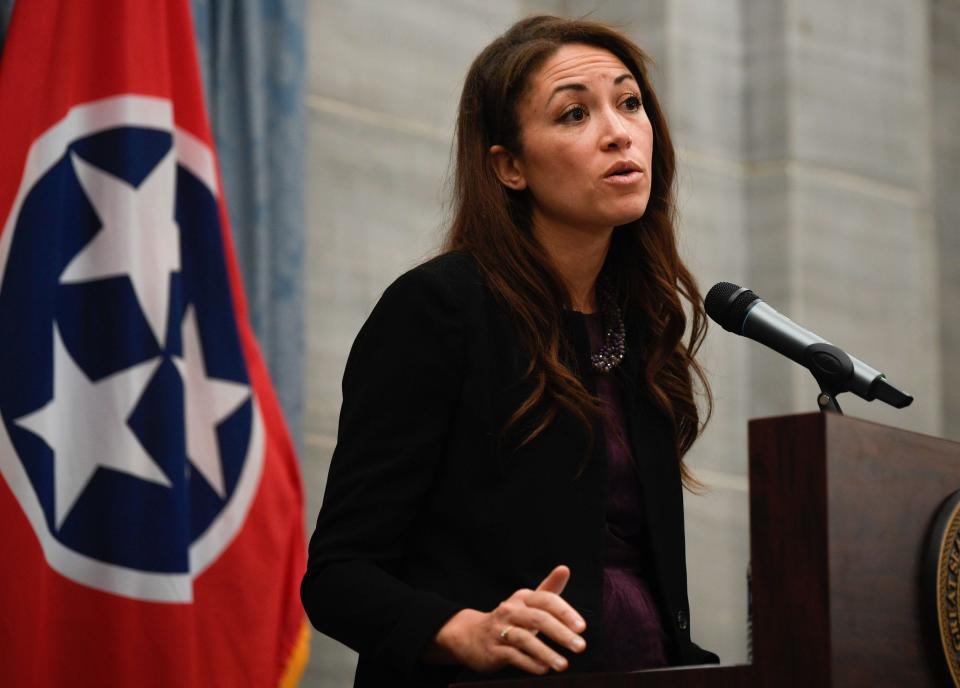Tennessee education officials consider changes to school ratings system
The Tennessee Department of Education is considering changes to the way it assesses schools and districts and how it measures success, factors that are part of the calculation that determine school letter grades.
One of the factors that may be adjusted is the Tennessee Value-Added Assessment System, which measures growth in student test scores, quantifying how well students improved from one year to the next. The score is a significant calculation in letter grades assigned to districts.
While the department is considering changes to measures that factor into school letter grades, it is unclear if it is considering overhauling the letter grade system altogether.
Knox County Schools Superintendent Jon Rysewyk said this year he's "not a big fan of that part of the grading system" because the A-F grades assigned to individual schools don't allow community numbers to understand the nuances that go into education.
For the 2021-2022 pandemic-altered school year, Knox County Schools received a Level 1 Tennessee Value-Added Assessment System composite score, which is the lowest level of growth. It's the first time the district didn't receive the highest score of a 5 in a decade.
More: Memo: Tennessee halts assignment of A-F letter grades to schools
Four Knox County schools were on this year's priority list, so they would have earned grades of F, according to the accountability framework. The district as a whole was labeled as "in need of improvement."
Rysewyk said a lack of academic growth and chronic absenteeism highly affected the scores.
Changes ahead?
In recent weeks, Tennessee Department of Education officials have met with school district leaders at least twice to say they plan to update a federally required plan outlining these accountability measurements. The plan is a requirement of the Every Student Succeeds Act and spells out the rubrics and interventions the TDOE uses to measure school success and assist schools with the lowest academic scores.
Earlier this month, the department sent a survey to school district leaders soliciting feedback on accountability "to begin a process of engagement around several topics related to adjustments to the accountability methodology."
The survey came in the weeks following the department's decision to pause school letter grades, set to publish for the first time this fall after years of delays.
In a letter to district leaders in late August, Tennessee Department of Education Commissioner Penny Schwinn cited COVID-19 learning disruptions and 2020-21 state testing participation rates as reasons for the pause. Department officials later told reporters there were no plans to change the accountability system, but that the department would be responsive to feedback from the U.S. Department of Education.

TDOE asks districts what it thinks 'A' and 'F' schools should be
School letter grades are the result of a state law passed in 2016. The letter grades also carry added weight as an accountability measure under the state's recently passed funding formula, Tennessee Investment in Student Achievement, or TISA, set to take effect in the fall.
Beginning in the 2024-25 school year, the law says, schools that score a D or F letter grade could consequentially require a corrective action plan or undergo an academic and fiscal audit.
The federal Department of Education found compliance issues with Tennessee's accountability measures, the TDOE has told district leaders. In its survey to district leaders, the TDOE said its Every Student Succeeds Act amendment, set to be submitted to the federal department in January, will address the compliance issues the federal education department found.
A USA TODAY Network-Tennessee request to the U.S. Education Department about the compliance issues has gone unanswered over the last week.
But the department appears to be soliciting feedback on its accountability model beyond the scope of the compliance issues it outlined to district leaders.
For instance, in the survey, the state department asked district leaders what an “A” and an “F” school should be or reflect, from the perspectives of parents, educators and community members. While the department has not issued letter grades, it has issued school designations, which recognize the highest and lowest performing schools and provided a glimpse of which schools would have earned letter grades of A and F.
Had the department moved forward with issuing letter grades, reward schools would have earned grades of A, and priority schools would have earned grades of F, according to the accountability framework.

TDOE spokesperson Brian Blackley said the responses were gathered to continue efforts to make accountability measures "digestible and understandable."
"The department is taking every opportunity to sharpen the messaging and support for the use and interpretation of school letter grades, for a wide variety of intended audiences," Blackley said. "Stakeholder engagement in this process is important for the use of school letter grades to have the greatest impact."
The USA TODAY Network-Tennessee also asked if the department would submit changes to its school letter grades system in its ESSA amendment if that was the will of the majority of survey respondents.
"We cannot predict what adjustments will be made based off public comment that has not yet been received," Blackley said. "The department will share impact results with the field prior to the amendment being approved."
In a conversation with district leaders, TDOE said it plans to continue with meetings on the planned Every Student Succeeds Act amendment in October and November and then solicit public comment in November and December.
Eve Carney, the TDOE's chief of districts and schools, is leading the accountability work. Rachael Maves, chief of performance and preparation, left the department earlier this month.
TDOE again considers changes to growth measures

As for changes to Tennessee Value-Added Assessment System, or the growth measure that is factored in to school letter grades, the department asked district leaders if it should "explore ways to improve the year-to-year stability of growth calculations," polling them on an adjustment to measure for multi-year scores, instead of year-to-year scores.
Urban districts Memphis-Shelby County Schools, Metro Nashville Public Schools and the state-run Achievement School District each saw record-low scores on state testing amid the pandemic, and were recognized with the highest growth score this recent academic year for returns to pre-pandemic levels.
This would not be the first time the TDOE has reconsidered growth measures under Schwinn's leadership of the department. Early in her tenure, in September 2019, Schwinn suggested changes to accountability that would allow districts to choose between accountability measures that included growth scores and those that looked solely at achievement.
This article originally appeared on Memphis Commercial Appeal: Tennessee education officials mull changes to school ratings system

